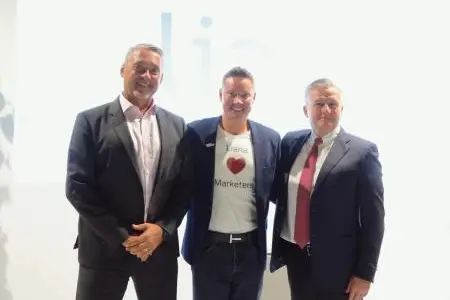PHOTO
Liana Technologies, a software service provider, yesterday welcomed VIP guests to the Finland Pavilion at Expo2020 Dubai during The Future of MarTech VIP Day. The event focussed on wellbeing in the workplace, what organisations can expect in the future of MarTech and why digital transformation is now more crucial than ever before.
Tomi Saikkonen, Vice President of Liana Technologies said: “The pandemic has been a difficult time for everyone, however, there were two positive things which came from it. The first is organisations realising how important people are to get the job done. There isn’t room to compromise on employee wellbeing anymore. The second is the adaptation of modern technology. This is an important conversation to have now as it’s shaping the future of work and operations.”
Mikael Vainio, Managing Partner of Hintsa Performance, presented a keynote speech on “Leading Wellbeing.” During his presentation, Vainio discussed how work has evolved through the industrial revolutions. Industry 4.0 requires employees to have a higher cognitively flexibility to continuously adjust to complex tasks and reskilling themselves to remain relevant in their caeer. The Future of Jobs and Skills report by The World Economic Forum estimates 65 per cent of children entering primary school today will work in jobs that don’t exist yet.
The stress of today’s work environment and lack of wellbeing is starting to show. DDI’s Global Leadership Forecast found 60 per cent of leaders present strong indicators of burnout, with an additional 40 per cent of employees struggling with mental health issues due to the pandemic.
Vainio said: “There is a direct correlation between wellbeing and productivity of employees. Moreover, there is also a clear link between personal wellbeing and company performance. Investing in employee wellbeing is no longer a luxury, but rather a must.” In its study, ‘The Impact of Excellent Employee Wellbeing’ O.C. Tanner Institute found investing in wellbeing resulted in 19 per cent higher productivity, 89 per cent better engagement and 50 per cent less costs for absenteeism.
This was followed by a keynote presentation on “The Future of MarTech” by Robert J. Webb, Executive Advisor of TBM. Webb highlighted the importance of digital transformation in today’s business climate. In its annual Digital Pulse survey, Russell Reynolds Associates found 90 per cent of organisations feel digitisation is disrupting their industry; however, according to the 2020 Future of Leadership Global Executive Study and Research Report only 13 per cent of organisations feel ready to compete in the digital economy. Deploying digital technology provides a competitive advantage to organisations with a 10 per cent revenue gain and 15 to 25 per cent cost reduction over a two to three year period.
Legacy is a hindrance in digital transformation with datasets siloed in different departments. Organisations will need to implement a broad architectural redesign to utilise the data effectively. It starts with having the right people with the right mindset and skillset. The next step is to think about how you clean the data and deploying the right tools to drive insights and actions. This will enable organisations to understand their customers better and improve the customer journey. Focusing on individual touchpoints aren’t enough as 25 per cent of customers will deflect after just one bad experience.
Webb said: “Digital transformation is no longer a “nice to have” for organisations but a must. The key to successfully deploying digital transformation is to slow down. Companies are under so much pressure to cut costs, increase performance and drive sales which causes leaders to default to survival mode. This affects their cognitive ability to think innovatively. Slowing down allows leaders to think rationally, plan and strategically implement solutions that would best benefit the organisation.”
Liana Technologies is an exhibition partner of the Finish Pavilion at Expo2020 Dubai and is one of the more than 110 companies and 40 partners representing Finnish innovation and technological know-how.
-Ends-
About Liana Technologies
Liana Technologies is a European software company founded in 2005. We are specialised in digital marketing and communication software and one of the fastest growing companies in Finland. Our offices are located in Oulu (HQ), Helsinki, Dubai, Munich, Hong Kong and Stockholm.
Liana’s marketing technology stack, Liana®Cloud, is used by more than 3,500 customers worldwide including companies such as American Express, Abu Dhabi Ports, Accor Hotels, Hertz, Toyota, Ikea and Starbucks. Our mission is to provide all our customers the best solutions for their digital marketing needs.
© Press Release 2021
Disclaimer: The contents of this press release was provided from an external third party provider. This website is not responsible for, and does not control, such external content. This content is provided on an “as is” and “as available” basis and has not been edited in any way. Neither this website nor our affiliates guarantee the accuracy of or endorse the views or opinions expressed in this press release.
The press release is provided for informational purposes only. The content does not provide tax, legal or investment advice or opinion regarding the suitability, value or profitability of any particular security, portfolio or investment strategy. Neither this website nor our affiliates shall be liable for any errors or inaccuracies in the content, or for any actions taken by you in reliance thereon. You expressly agree that your use of the information within this article is at your sole risk.
To the fullest extent permitted by applicable law, this website, its parent company, its subsidiaries, its affiliates and the respective shareholders, directors, officers, employees, agents, advertisers, content providers and licensors will not be liable (jointly or severally) to you for any direct, indirect, consequential, special, incidental, punitive or exemplary damages, including without limitation, lost profits, lost savings and lost revenues, whether in negligence, tort, contract or any other theory of liability, even if the parties have been advised of the possibility or could have foreseen any such damages.




















